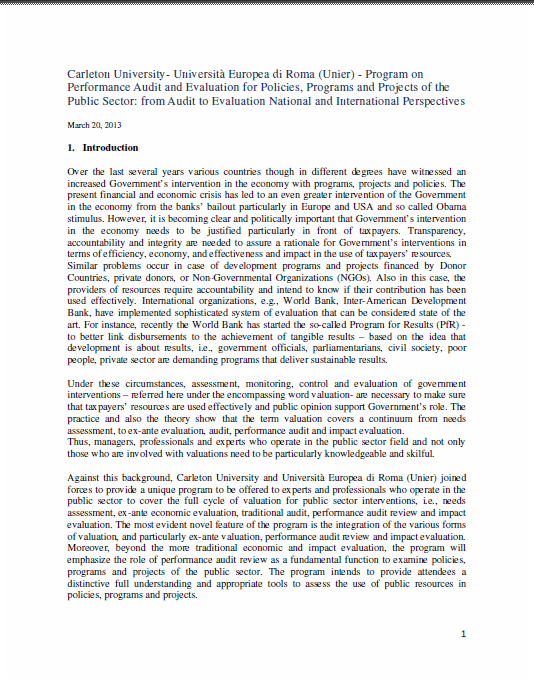 Carleton University- Università Europea di Roma (Unier) Program on Performance Audit and Evaluation for Policies, Programs and Projects of the Public Sector from Audit to Evaluation; National and International Perspectives - March 2013
di Pietro Masci Over the last several years various countries though in different degrees have witnessed an increased Government’s intervention in the economy with programs, projects and policies. The present financial and economic crisis has led to an even greater intervention of the Government in the economy from the banks’ bailout particularly in Europe and USA and so called Obama stimulus. However, it is becoming clear and politically important that Government’s intervention in the economy needs to be justified particularly in front of taxpayers. Transparency, accountability and integrity are needed to assure a rationale for Government’s interventions in terms of efficiency, economy, and effectiveness and impact in the use of taxpayers’ resources.
Similar problems occur in case of development programs and projects financed by Donor Countries, private donors, or Non-Governmental Organizations (NGOs). Also in this case, the providers of resources require accountability and intend to know if their contribution has been used effectively. International organizations, e.g., World Bank, Inter-American Development Bank, have implemented sophisticated system of evaluation that can be considered state of the art. For instance, recently the World Bank has started the so-called Program for Results (PfR) - to better link disbursements to the achievement of tangible results – based on the idea that development is about results, i.e., government officials, parliamentarians, civil society, poor people, private sector are demanding programs that deliver sustainable results.
Under these circumstances, assessment, monitoring, control and evaluation of government interventions – referred here under the encompassing word valuation- are necessary to make sure that taxpayers’ resources are used effectively and public opinion support Government’s role. The practice and also the theory show that the term valuation covers a continuum from needs assessment, to ex-ante evaluation, audit, performance audit and impact evaluation.
Thus, managers, professionals and experts who operate in the public sector field and not only those who are involved with valuations need to be particularly knowledgeable and skilful.
Against this background, Carleton University and Università Europea di Roma (Unier) joined forces to provide a unique program to be offered to experts and professionals who operate in the public sector to cover the full cycle of valuation for public sector interventions, i.e., needs assessment, ex-ante economic evaluation, traditional audit, performance audit review and impact evaluation. The most evident novel feature of the program is the integration of the various forms of valuation, and particularly ex-ante valuation, performance audit review and impact evaluation. Moreover, beyond the more traditional economic and impact evaluation, the program will emphasize the role of performance audit review as a fundamental function to examine policies, programs and projects of the public sector. The program intends to provide attendees a distinctive full understanding and appropriate tools to assess the use of public resources in policies, programs and projects.
It has to be acknowledged that the program is novel and extremely ambitious as it attempts to cover at least three large areas that so far have been to a great extent independently treated, i.e., cost benefits analysis (CBA), performance audit and impact evaluation and also touch upon needs assessment and traditional audit. Time and continuous learning and adjustments are needed to achieve this goal. The strategy is to provide two different paths. As a starting point, a 6-day program will cover the main issues, topics and techniques without going in-depth but offering the basic understanding and prompting the interest to know more. Subsequently, a full 16-week course will follow as an expansion of the 6-day program, in which the coverage will be extensive, e.g., the analytical, statistical and econometric tools will be presented in more details.
The focus of the program is valuation of public sector intervention in the broadest terms, with a more specific attention to the program and projects directed to developing countries.

(click sull'immagine per leggere il documento)
(03/20/2013)
Home training    |


